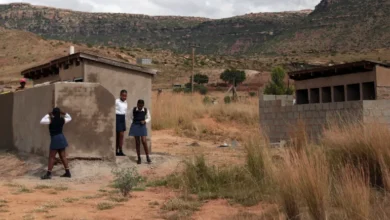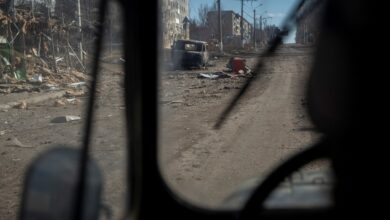Israel bombs near Damascus as Syrians celebrate freedom

- Al Jazeera’s correspondent in Damascus says Israeli air strikes that shook the Syrian capital on Friday night targeted the headquarters of the army’s fourth division and a radar battalion in the nearby countryside.
- Tens of thousands of people took to the streets of Damascus and other towns and cities across the country on Friday to celebrate the fall of Bashar al-Assad.
Diplomats to meet in Jordan for Syria talks
All eyes are on the new administration in Damascus, following the removal of Bashar al-Assad last Sunday.
Jordan, which neighbours Syria, is set to host high-level talks on the political transition there.
Arab diplomats, the Turkish Foreign Minister Hakan Fidan, and US Secretary of State Antony Blinken are expected to attend the summit in Jordan’s port city of Aqaba.
Al Jazeera’s Nour Odeh begins our coverage from Aqaba, Jordan:
Syrians bring down Hafez al-Assad statue in Damascus
Syrians removed another giant statue of the father of Bashar al-Assad and the founder of the family’s five-decade rule over Syria in the capital.
Syrian currency strengthens to 11,500-12,500 pounds per US dollar
Damascus currency exchangers say the Syrian currency today has strengthened to between 11,500 and 12,500 pounds to one US dollar.
The pound had traded at 47 to the dollar before protests against President Bashar al-Assad erupted in March 2011 triggering a brutal 13-year war.
The conflict, combined with Western sanctions, a currency squeeze linked to neighbouring Lebanon’s economic free-fall, and the government’s loss of northeastern oil-producing territories to the control of a Kurdish-led group, have all contributed to the financial meltdown.
By 2023, the Syrian pound had depreciated by 141 percent against the US dollar, according to the World Bank. The consumer price inflation was estimated to have risen by 93 percent, it added.
To tackle the currency collapse and drop in living standards, the new Syrian administration hopes Western countries will lift sanctions.
The US repeatedly tightened economic restrictions on Syria since first imposing them following al-Assad’s violent crackdown on protesters in 2011. The toughest, known as the Caesar Act, passed Congress in 2019. They apply across Syrian business sectors, to anyone dealing with Syria regardless of nationality and to those dealing with Russian and Iranian entities in Syria.
The sanctions will “sunset” – or expire – on December 20 unless renewed by US legislators. Sources told Reuters of ongoing talks between the US and the UAE on allowing Caesar sanctions to expire without renewal.










